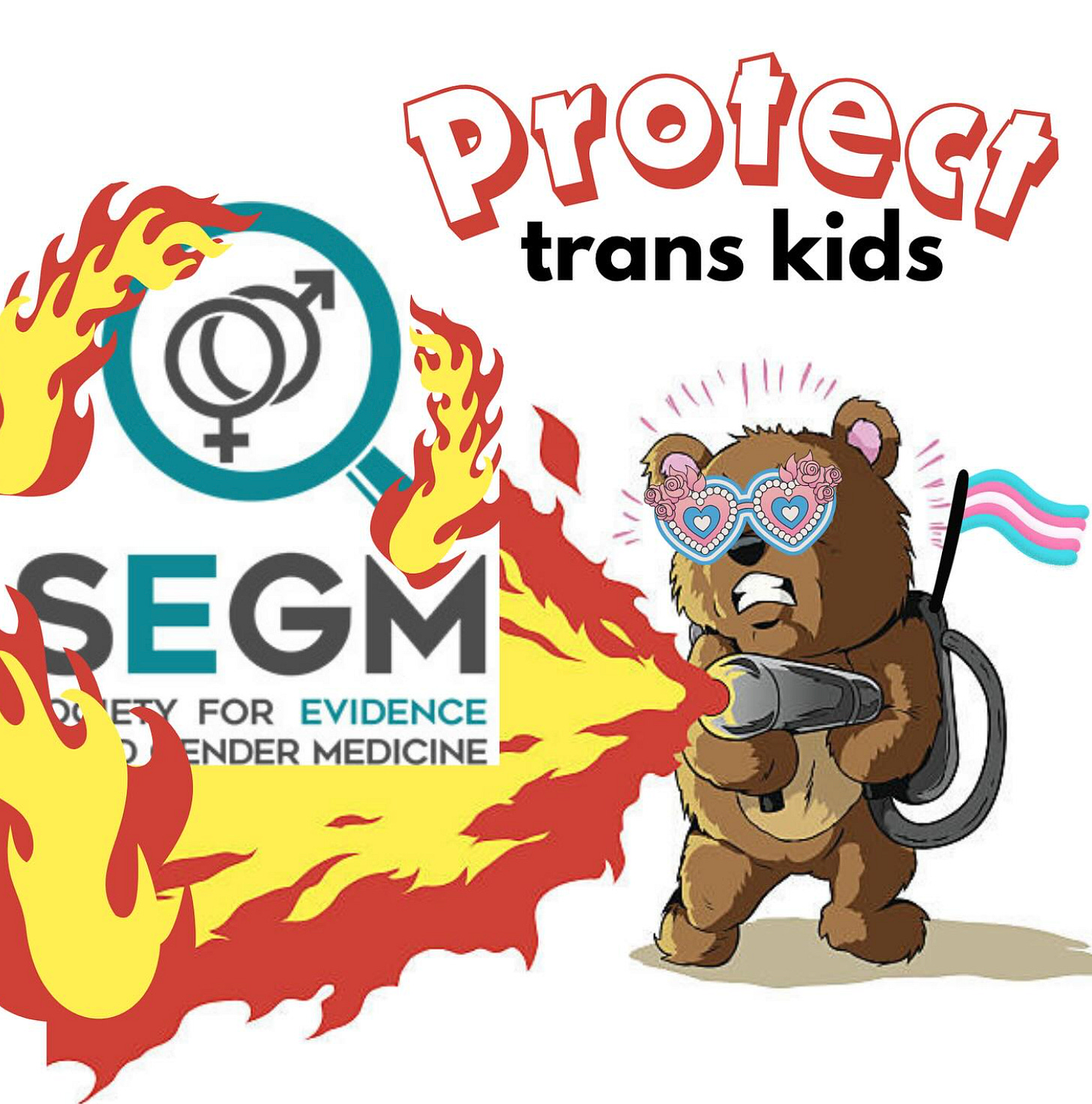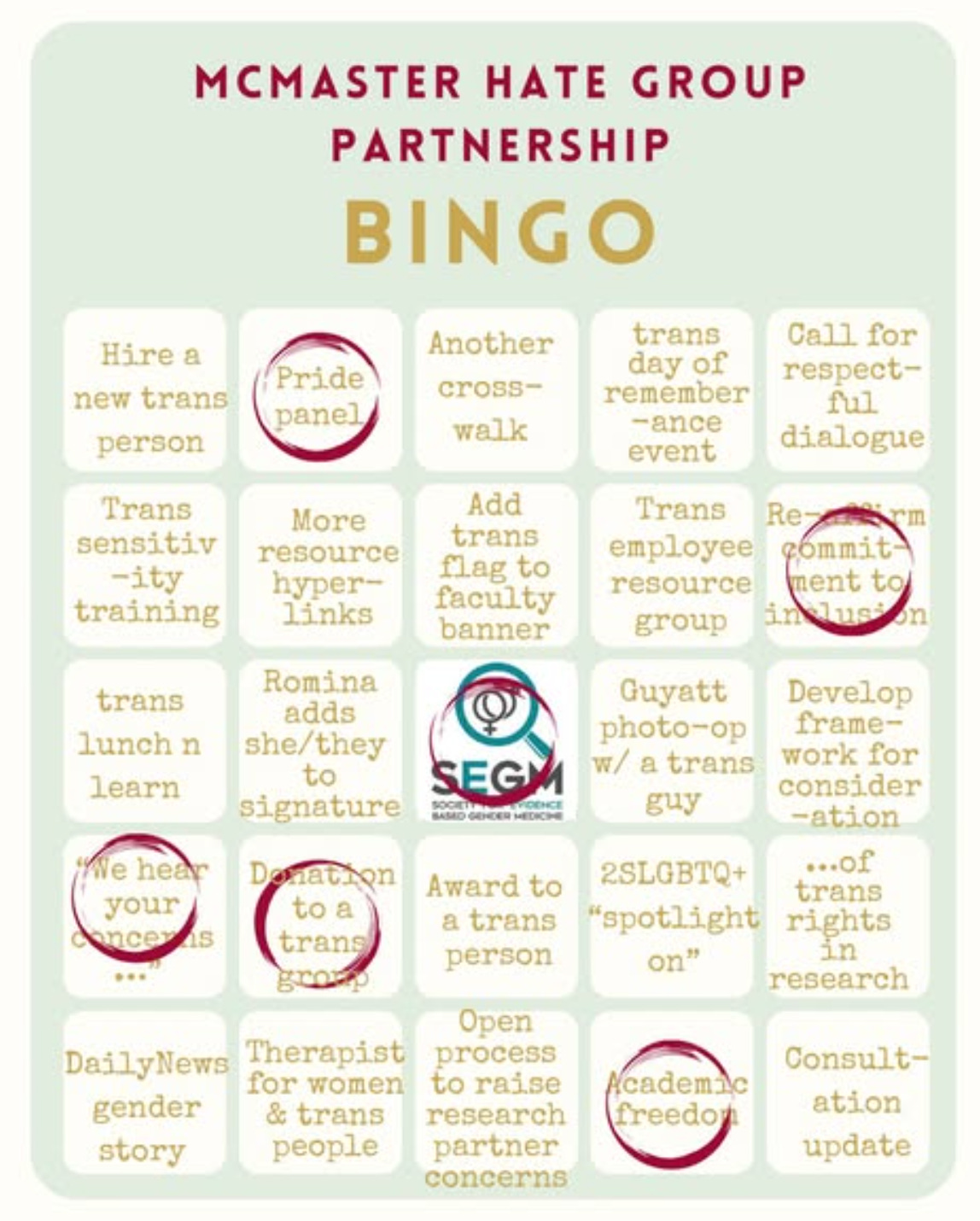From the Birthplace of Evidence-Based Medicine, a Gender Medicine Clusterfuck
Bans and activists and liberals who want to be seen as good people—oh my!

[Note: I wrote this up starting last week, but it has taken me a while to finish, and since then Jesse Singal has done a great two-part series on it—including this interview with Gordon Guyatt. So read that, too!]
The Society for Evidence-Based Gender Medicine (SEGM), a nonprofit that aims “to promote safe, compassionate, ethical and evidence-informed healthcare for children, adolescents, and young adults with gender dysphoria,” contracted a team at McMaster University to conduct systematic reviews (SRs) on puberty blockers, cross-sex hormones, and mastectomies for minors with gender dysphoria.
A systematic review (SR) gathers all the evidence around a particular medical condition or scientific question, and evaluates its quality, certainty, and, ultimately, reliability. If deemed of low or very low quality, the conclusions can’t be relied upon. Those creating guidelines for treating a condition with weak evidence should be making weak recommendations.
SRs are the backbone of '“evidence-based medicine” (EBM—more on that below)—and a McMaster professor, Gordon Guyatt, is often known as the father of EBM. He was part of the team putting together the SRs that SEGM paid for.
By now, we know a few things about SRs when it comes to “gender-affirming care.” In 2022, the World Professional Association for Transgender Health (WPATH)—an organization of both clinicians and activists—released its eighth version of “Standards of Care for the Health of Transgender and Gender Diverse People.” The document claimed that “a systematic review regarding outcomes of treatment in adolescents is not possible.”
WPATH, it turned out, was lying—it had in fact contracted Johns Hopkins to conduct SRs, but suppressed them. Those SRs, like all others that have been conducted—including those by the McMaster team—showed that the evidence for gender-affirming care in minors is generally of low- and very-low certainty. Thus, there should be no strong recommendations for treating gender dysphoria with puberty blockers, cross-sex hormones, or surgeries.
For years, pediatrician Julia Mason and others tried to get the American Academy of Pediatrics (AAP) to conduct an SR of their own—because it does not make sense to craft strong recommendations based on weak evidence, as they have done. They refused until last year, when they also reaffirmed their 2018 statement on gender-affirming care, despite the fact that it was also based on weak evidence and, as Dr. James Cantor showed, included citations that didn’t back its own statements. As of yet, no SR from the AAP. But we at least had those that SEGM funded—for which McMaster had complete independence.
Then, on August 14, Guyatt and compatriots who’d participated in the SRs released a very strange statement, called “Systematic reviews related to gender-affirming care.”
“Members and allies of 2SLGBTQIA+ communities have raised concerns about recent systematic reviews related to gender-affirming care,” it read. “These concerns center on the funding source, and specifically on the potential for the research to be misused to harm trans youth and to deny gender-affirming care.”
The authors noted that the SRs suggest that “the outcomes of specific aspects of care for transgender patients remain uncertain,” and that “Authors of scientific articles have a responsibility to attend to how their contributions will be used.” Translation: We never said these SRs should be used to ban gender medicine. They added that “clinicians have an obligation to care for those in need, often in the context of shared decision making. It is unconscionable to forbid clinicians from delivering gender-affirming care.”
The statement came after a nasty social media campaign, plus the occasional in-person accosting of SR authors. That is: a small but loud group harassed the researchers into turning their backs on their own research, because it was funded by SEGM, and because it was used to justify bans against gender-affirming care for minors—that is, used to deny the treatments that they’d found low-certainty evidence for.
Evidence-based medicine (EBM), from SEGM’s name, is “the conscientious, explicit and judicious use of current best evidence in making decisions about the care of the individual patient. It means integrating individual clinical expertise with the best available external clinical evidence from systematic research,” per Dr. David Sackett in 1996.
EBM has three general buckets: evaluation of research; clinical consensus; and values and preferences. That is: you look not just at what the research says. You look at what clinicians and experts think. And you consider the values and preferences of the patients.
Values and preferences can be further broken down into these tenets:
Respect for Autonomy: shared decision-making with the patient, based on properly informing them about their choices—and the evidence.
Beneficence, or doing good: the treatment should attempt make the patient better.
Nonmaleficence, or not doing harm.
Justice: Equitable distribution of treatments.
Guyatt has been clear that low-certainty evidence alone does not mean you ban something, or discontinue it—many, many medical procedures are based on lackluster evidence. From my brief observations, Guyatt was not interested in seeing youth gender medicine as exceptional, as different from, say, deviated septum surgery. (I was told there was only a 50 percent chance of it improving my chronic sinus problems, but weighed the risks and benefits, and went for it. It worked.) If the evidence is low-certainty and there’s no medical consensus, then it’s on to values and preferences.
Guyatt did not consider the larger context, including how adults have proselytized to children and their parents about transition being evidence-based, life-saving, and medically necessary—statements that absolutely cannot be proven true in the face of low-certainty evidence. He did not consider the ethical aspects of, say, causing infertility in young people for procedures that aren’t medically-necessary.
And that’s the tragedy of Guyatt’s backtracking. Because the SRs alone aren’t being used to “forbid clinicians from delivering gender-affirming care.” It’s the SRs in combination with so many other issues.
We don’t know what’s being treated—are we attending to gender dysphoria, or affirming a trans identity through embodiment goals?
How do we know the harms if no one tracks them?
How do you measure harm when the adverse side effects of medications are the desired effects?
The cohort seeking these interventions bears little resemblance to the population for whom they were designed.
That original population was almost entirely same-sex-attracted youth—why was that connection never studied?
More people are detransitioning than originally thought—we don’t have a way to measure how many, or any protocol in place to help and support them.
The field leapt from considering transition too risky for people with other mental illnesses, to thinking transition would cure other mental illnesses.
And so much more!
In fact, then, it would make mountains of sense for clinicians themselves to decide to hit the pause button on gender-affirming care. It would make sense for them to regulate themselves, crafting very weak recommendations, or extreme caution about “delivering gender-affirming care.”
Maybe Guyatt doesn’t understand the larger context. Maybe he, like so many other liberals, chafes at banning on a visceral level. Maybe the activists got to him and he and the others just don’t like being called bigots. Maybe they believe SEGM really is a hate group, as the SPLC declared.
None of that should take away from their finding, which is that no one can say for sure if transition with help or hurt, and thus, the foundation of youth gender medicine is flimsy as dust.
They ended their statement:
We acknowledge concerns that have been raised.1 Our research agreement with SEGM ended in 2024. When the agreement started in 2021, the organization appeared to us as non-trans, cis-gender researchers to be legitimately evidence-based.
We will no longer accept funding from SEGM. As recommended by community advocates, we have also personally made a donation to Egale Canada’s legal and justice work, noting their litigation efforts aimed at preventing the denial of medically necessary care for gender-diverse youth.
They atoned, and they tithed. They stopped acting like scientists, and instead acted like sinners.



There have been 2 testosterone products submitted to the FDA for approval and both were denied. A patch and a gel dosed at ~10% of the male dose. Both had been tested in RCTs for female sexual dysfunction in postmenopausal women. The patch showed very modest benefit and the gel wasn't significantly different vs. placebo for the primary endpoint but showed (small) improvements in some secondary endpoints. More acne and hair growth with T but no increase in severe adverse effects. The trials were short (12-24 weeks), were too small to detect rare serious adverse effects, and had high rates of attrition. The FDA's main concern was the lack of long-term safety data. They didn't say women and their doctors should decide - they would not let these products enter the market because there was potential for severe harm.
But here we are with the father of EBM saying we should let children(!) engage in shared decision making about taking testosterone dosed to achieve serum concentrations >6 x the normal female range, and typically lifelong.
This is a fantastic summary of McMastergate, if we can call it that. This is the thing people should read BEFORE Jesse Singal's piece, which goes into a greater depth that not everyone will want.